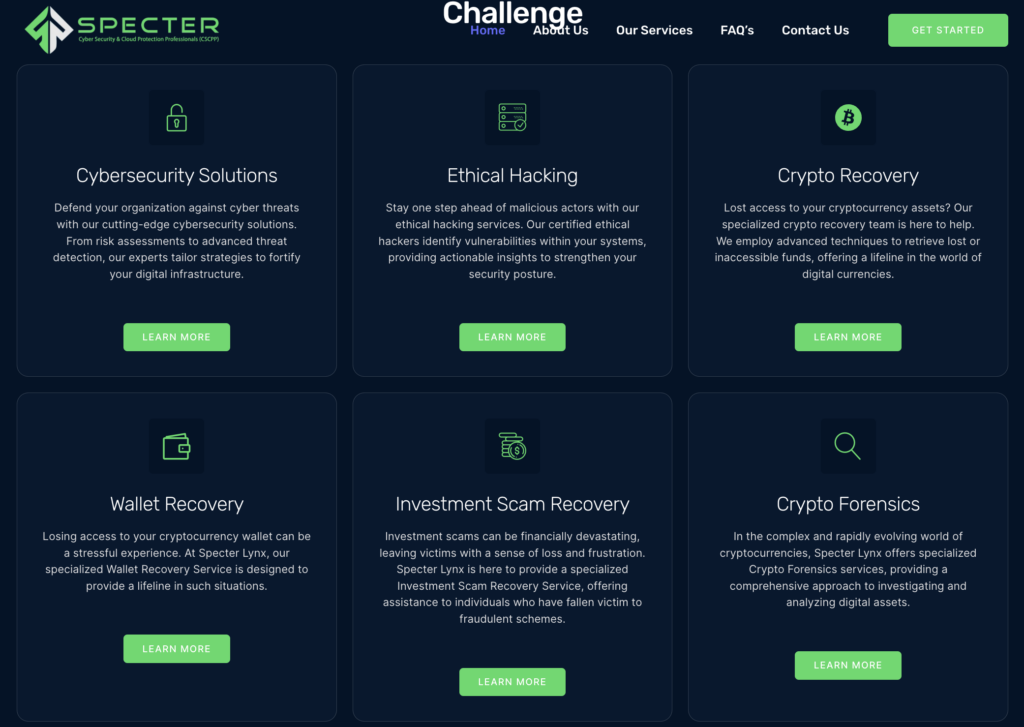The False Promises of Crypto and Scam Money Recovery

In the ever-evolving landscape of digital security, scams have become all too common, preying on the vulnerabilities and desperate hopes of individuals. Websites like SpecterLynx[.]com exploit these vulnerabilities by offering services that are typically unrealistic or outright impossible, such as hacking services, scam recovery, and cryptocurrency retrieval.
The Lure of Unrealistic Promises

Scammers often use the promise of impossible services to trigger a sense of hope in victims. For instance, the idea that one can easily recover lost funds from a scam or access locked cryptocurrency wallets is highly appealing but largely unfeasible in practice. SpecterLynx[.]com – Archive – and similar sites capitalize on this by claiming to offer:
- Ethical Hacking Services: They promise to ethically penetrate and identify weaknesses in digital systems. However, true ethical hacking is heavily regulated, requires consent, and is performed by certified professionals under strict ethical standards, details of which SpecterLynx does not provide.
- Cryptocurrency and Wallet Recovery: The site claims it can recover lost cryptocurrencies and access wallets. In reality, once cryptocurrency is stolen or a private key is lost, recovery is often impossible. Such promises play on the lack of knowledge and desperation of victims.
- Investment Scam Recovery: They assert the ability to recover funds lost in investment scams. While some legitimate services can help in disputing fraudulent transactions through banks or legal means, the recovery of funds directly from the scammers as SpecterLynx suggests is highly dubious.
Analysis of Website Claims
Upon closer examination, the claims made by SpecterLynx[.]com exhibit typical scam characteristics:
- Vague and Grandiose Descriptions: The site uses impressive-sounding but vague language about its capabilities without detailing specific methodologies or evidential case studies.
- Unverified Expertise and Results: Claims such as “47M+ Threats Blocked” and “99% Uptime Server” are not supported with verifiable data or third-party endorsements.
- Use of Reputable Names Without Evidence: The website displays logos from well-known companies and media outlets, suggesting affiliation or endorsement without any proof of such relationships.
- High-Pressure Sales Tactics: Urgent calls to action such as “File Complaint” or “Get Started” are designed to push visitors into making hasty decisions.
The Risk of Refund and Recovery Scams
As outlined by the Federal Trade Commission (FTC) in their guidance on refund and recovery scams, if you’ve been a victim of a scam, you might be vulnerable to additional fraud. In these scams, fraudsters promise to recover the money you lost or the item you never received — for a fee. Sadly, those who pay these fees often end up losing more money. This is particularly relevant when dealing with sites like SpecterLynx, which offer recovery services that are likely infeasible.
Lack of Legitimacy and Transparency
A legitimate company operates with a high degree of transparency, which includes providing detailed contact information, regulatory compliance, and credentials. SpecterLynx lacks these essential details. There is no physical address, direct contact information, or details about the company’s registration, making it impossible to verify its legitimacy.
Conclusion

The story of a visitor losing $27,000 to Specter Lynx is a stark reminder of the risks associated with these types of websites. While the desire to recover lost funds or protect digital assets is understandable, it is crucial to remain vigilant and skeptical of services that sound too good to be true. If you encounter similar claims, it’s advisable to conduct thorough research, seek out reviews and testimonials from independent sources, and consult with recognized professionals in the cybersecurity field. Remember, an informed public is the best defense against scams.




